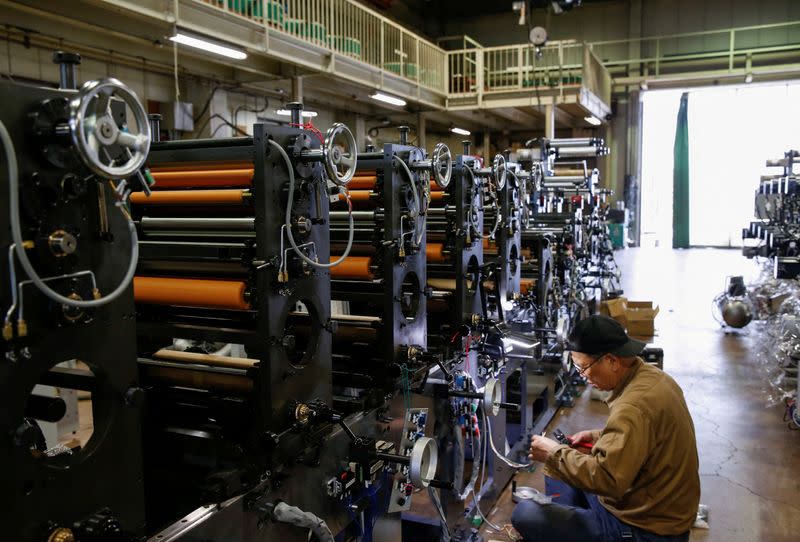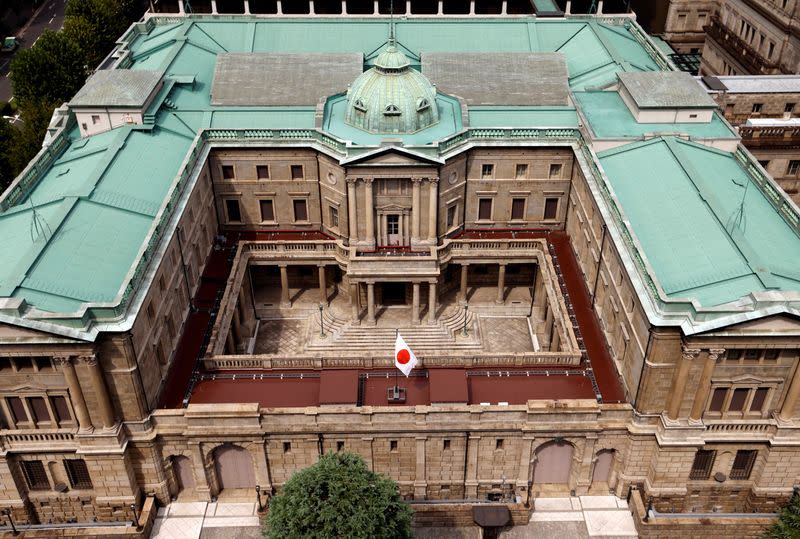BOJ upbeat on regional Japan but warns of uncertain wage outlook
By Leika Kihara
TOKYO (Reuters) -The Bank of Japan upgraded its assessment of most regional economies on Thursday but warned that rising living costs and global uncertainties were clouding the outlook for sustained price and wage increases.
The cautiously optimistic tone comes amid uncertainty over whether conditions will allow the central bank to phase out its massive stimulus.
While many firms expect increases to be agreed in next year's wage talks to offset labour shortages, they are undecided as to the pace of increases, the BOJ said in a report summarizing the views of its regional branch managers.
"The (firms) wanted to scrutinise price developments and what their competitors could do in deciding on the pace of wage hikes," the report said.
In a separate quarterly report, the BOJ revised up its assessment for six of Japan's nine areas, saying all regions were seeing their economies "pick up, or recover moderately".
The reports will be closely scrutinised by the bank's nine member board at a policy meeting on Oct. 30 and 31 that looks to compile fresh projections on quarterly growth and inflation.
BOJ Governor Kazuo Ueda has sought to reassure markets that no change in policy is imminent, but creeping inflation and rising domestic yields are fanning market expectations that the bank will soon end its controversial bond yield control policy.
The reports have drawn more attention than usual this year for possible early clues as to whether wage hikes will continue next year and broaden out to smaller firms.
The BOJ has said sustained, broad-based wage increases are crucial to durably achieve its 2% inflation target, and allow it to exit ultra-loose monetary policy.
UNCERTAINTY
The branch managers warned that slowing Chinese demand, geopolitical risks such as the Middle East crisis, and frugal consumers could discourage firms from raising wages and prices.
"When uncertainty is so high, it's hard to say how next year's wage talks will play out," said Tetsuya Hiroshima, the BOJ's branch manager overseeing the Tokai central Japan region that is home to auto giant Toyota Motor Corp..
"Many firms are now at a stage where they want to carefully gauge the profit outlook" in deciding how much they raise pay, he told a news conference.
Shinsuke Oyama, branch manager for the Kyushu southern Japan region, said supermarkets were offering discounts as consumers opt for cheaper goods or reduce the number of items they buy.
"Many firms that are hiking prices are doing so mostly to pass on higher raw material costs," Oyama said. "They're not yet being able to prepare for expected rises in labour costs."
The remarks underscore the challenge the BOJ faces in achieving the wage-inflation spiral needed to sustainably hit its price target, in which higher wages give consumers purchasing power that in turn allows firms to hike prices.
The BOJ remains an outlier among a global wave of monetary policy tightening by central banks, as it focuses on supporting the economy with a combination of negative short-term interest rates and a cap on the 10-year bond yield around 0%.
Despite inflation exceeding the BOJ's target of 2% for more than a year, Ueda has vowed to keep ultra-low rates until a more demand-driven price rise takes hold backed by wage growth.
While firms offered wage increases unseen in three decades this year, the key for policymakers is whether the trend continues next year and spreads to smaller firms across regions.
Japan's largest labour organisation Rengo is set to demand wage hikes totalling 5% or more, its president said on Thursday, heightening prospects of sustained wage gains.
(Reporting by Leika KiharaEditing by Edmund Klamann and Gareth Jones)

 Yahoo Finance
Yahoo Finance 

